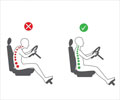The irrational or maladaptive beliefs that the pain will never get better are clinically known as pain catastrophizing and can slow down treatment benefits.

‘A chronic pain patient's irrational doubts about never getting better can influence both his reactions to pain and even treatment outcomes.’





The influence of these irrational beliefs on both patient behavior and chronic pain treatment success is of growing interest to the scientific community. "We are seeing that patients who tend to have these irrational beliefs are at greater risk of misusing opioid medicines and take longer to return to work when experiencing work disability for acute lower back pain," said Robert J. Gatchel.
"A more complete treatment model around this problem would promote changes in lifestyle habits and attitudes, and strengthen social support systems, alongside medical treatments. We need to take into consideration a series of treatment components that people have not considered before," he added.
The irrational or maladaptive beliefs that the pain will never get better are clinically known as pain catastrophizing.
"New research on brain imaging and the genetics of catastrophizing are highlighting the increased complexity of these beliefs and underline the need for a more complete model for pain treatment."
Advertisement
"There is a long history of evaluating the cognitive appraisal of pain on therapeutic outcomes and Dr. Gatchel's analysis of catastrophizing and comprehensive treatment approaches highlights certain aspects of why patients might feel less pain, why some patients recover faster, and how some better manage their conditions," Fuchs said.
Advertisement















